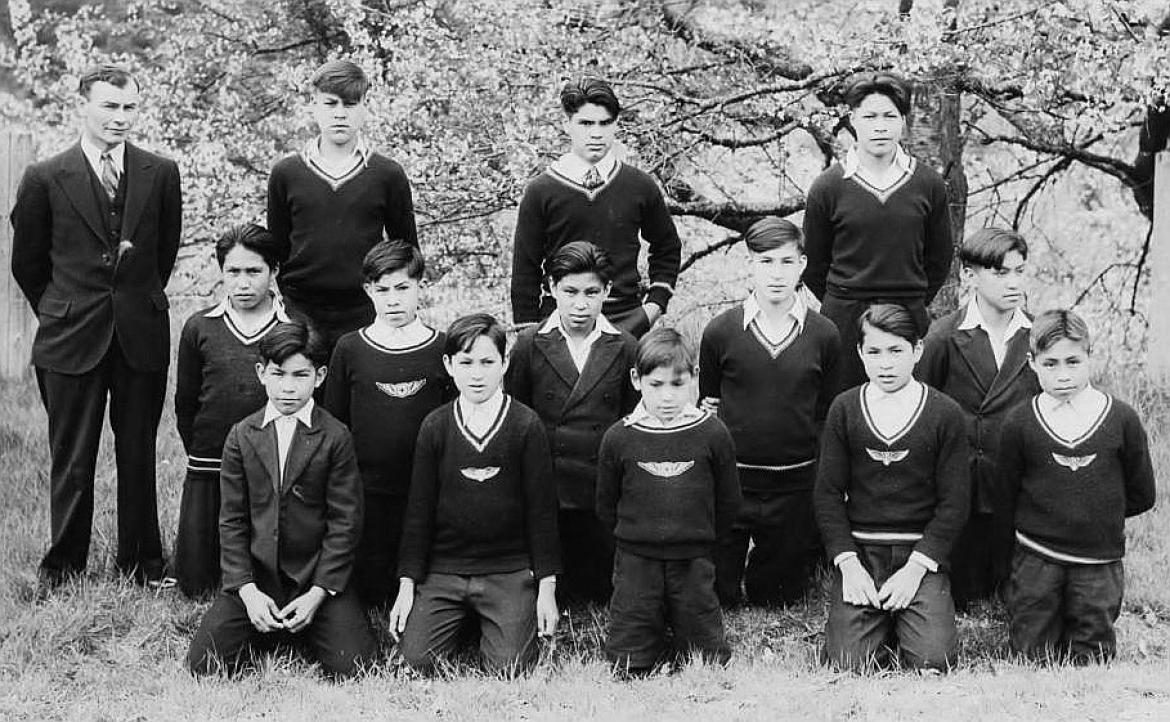
The Alberni Residential School operated from 1900 to 1973 in Port Alberni, BC. In 1995 a supervisor who worked at the school from 1948 to 1968 was convicted of 18 counts of indecent assault against Aboriginal students. He was sentenced to 11 years in jail. (Photo courtesy National Centre for Truth and Reconciliation Archives)
February 16, 2016 - 12:00pm
First Nations Studies professor Laura Meijer Drees examines impacts of residential schools and TRC’s final report
The mandate was clearly laid out when Canada’s Residential School system was envisioned: “Eliminate parental involvement in the intellectual, cultural and spiritual development of Aboriginal children.”
The fact a system founded on such a principle wasn’t completely torn down for more than 100 years is almost impossible to grasp. According to the executive summary of the Truth and Reconciliation Commission (TRC) report, Honouring the Truth, Reconciling for the Future, it wasn’t until the survivors of the system were able to find the strength, courage and support to bring their experiences to light in several thousand court cases that the truth was finally laid bare for all to see.
The report notes that, “The Commission heard from more than 6,000 witnesses, most of whom survived the experience of living in the schools as students. The stories of that experience are sometimes difficult to accept as something that could have happened in a country such as Canada, which has long prided itself on being a bastion of democracy, peace, and kindness throughout the world.”
“Children were abused, physically and sexually, and they died in the schools in numbers that would not have been tolerated in any school system anywhere in the country, or in the world. Getting to the truth was hard, but getting to reconciliation will be harder. It requires that the paternalistic and racist foundations of the residential school system be rejected as the basis for an ongoing relationship.”
It is on this platform that Vancouver Island University (VIU) First Nations Studies professor, Laurie Meijer Drees, will present on residential schools as part of VIU’s Arts and Humanities Colloquium Series, Feb. 19.
Why We Care: Thoughts on Canada’s Indian Residential School History, Medical Care, Consent and the Law will offer an overview of residential schools, published histories, the work of the Truth and Reconciliation Commission and the significance of its Final Report. In addition, Meijer Drees uses newly released details gained from her work as a TRC researcher and oral historian to illustrate and share perspectives on why it remains important to care about this history.
“Despite the Truth and Reconciliation Commission’s efforts to acknowledge and record residential school experiences, impacts and consequences, many gaps in our collective understanding of these institutions still exist,” said Meijer Drees.
“The TRC report supports and builds on the survivor testimonies that have so far provided our insights into these institutions but there is a dark shadow that the residential school system continues to cast over the nation. Part of the problem is the fact that the multifaceted history of Canada’s Residential Schools is very complex, and the sheer volume of this material in itself poses a challenge to our collective understanding and action.”
Why We Care: Thoughts on Canada’s Indian Residential School History, Medical Care, Consent and the Law is on Feb. 19 from 10 am - 11:30 am at VIU’s Malaspina Theatre, Building 310. It is the second of three presentations in the Arts and Humanities Colloquium Spring, 2016 series.
-30-
Media Contact: Dane Gibson, Communications Officer, Vancouver Island University
P: 250.740.6288 C: 250.618.7296 E: Communications@viu.ca TW: @viunews
Tags: Announcements



